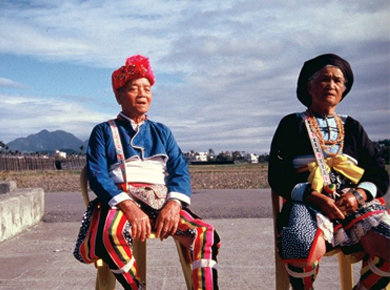"I want Amis music to be in every corner of the world and let everyone in the world know that there's an Amis tribe in Taiwan"
-Difang Duana.
Chances are you've listened to the song "Return to Innocence" before, by Michael Cretu's new age musical project "Enigma". It was a worldwide hit, being used even in the 1996 olympic games for a promotional video, as well as numerous movies, commercials, and radios across the world and across genres. The song is truly beautiful and it resonates with people from across cultural barriers. There's a certain quality to this track that, for the uninitiated, might just feel like thar sort of vague "exotic", "ethnic" and "mysterious" nature that a lot of new age music takes from, let's just say it, stealing from other cultures. Not celebrating, uplifting and crediting, no, simply taking for the shallow value a white man sees in something that sounds "non-western". That kind of thing drives me nuts, and what i hate the most is how, doing all this, Cretu did make an amazing song that resonates with me and with many others.
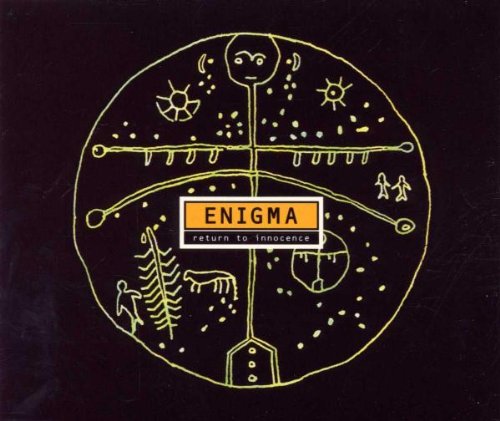
Cover for the "Return to Innocence" single, by Enigma

Cover for "Atmospheres 3" by ECO VIRTUAL
I mostly thought "oh, i love the vocals on this, i wonder if there's more information about them", and boy was i onto something. Indeed, there's a long history of legal battles, abuse towards indigenous people and overall music industry garbage we should discuss. This is a topic i'm pretty passionate about, since i do believe Difang was robbed of a lot of fame and most importantly, money he could've really used, specially during the last stages of his and his wife's lifes
Now, "Difang", who is that?

Igay Duana (left) and Difang Duana (right)
Many times they've had people come in with field recording gear, ready to archive their singing for educational purposes, or at least that was what they were told. One day back in 1978, the couple, along with many other people from the island, were recorded for a project, made with the intention of archiving and preserving their traditional Amis music, along with the musical traditions of other ethnic groups from the island. The music was released and indeed sold, but the Duanas signed a contract allowing this to happen, they were in the know.
Cut to 1988, the Duanas, along with a group of about 30 other aboriginal taiwanese musicians were flown to france by chinese authorities, to perform in two festivals, as commissioned by the Maison des Cultures du Monde, a sub-division of the national education ministry of the country. Allegedly, the musicians were only paid $15 a day for their performances, which, needless to say, is a complete joke. And continuing with the mistreatment, they were never told that their performances would be recorded, and later sold. They were only aware that they would go to France, perform, and return home 30 dollars richer. They never heard from this french institute again, or about the album that featured not only their recorded live performances in france, but also the recording made in 1978 of "Elders Drinking Song".
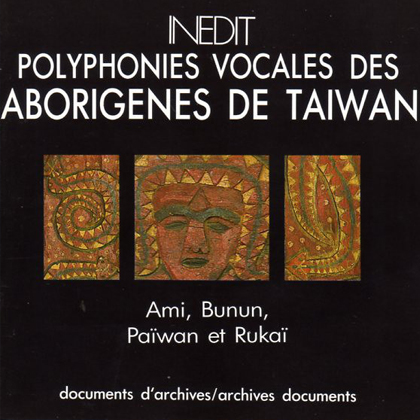
"Polyphonies vocales des aborigènes de Taïwan", the french CD with the unauthorized recordings by the Duanas and other musicians
And now, let's bring this back to the source of this whole thing. Michael Cretu, while looking for material to use for Enigma, found "Polyphonies vocales des aborigènes de Taïwan", the CD released by the aforementioned french ministry. Cretu arranged for about $6000 to be paid to the french ministry. Half of that money was kept by the ministry, and half was given to the related chinese authorities. Did the Duanas ever see any of this sum? No.
Michael Cretu indeed went ahead and sampled these recordings, made them onto a hit big enough to appear in a Taco Bell compilation CD, as well as numerous movies, TV shows and as previously stated, promotional material for the 1996 olympic games. Gill Blake, one of the people behind these promotional materials, was quoted saying that the song had "something spiritual and timeless" about it. I don't think he was wrong, nor did he know about who really was behind the beautiful samples that carry Enigma's track, but what isn't spiritual and timeless is the fact that Michael Cretu was sitting pretty, making bank off a song that is fully carried by the Duana's singing and their tradition.
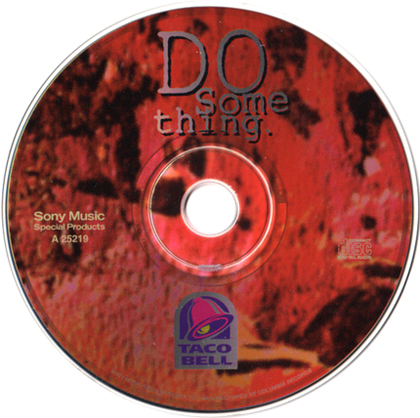
Taco Bell's "Do Something" compilation, where "Return to Innocence" appears
The Duanas found out about the song thanks to the Olympic incident, and they were not happy. They didn't know who was behind this, but with help from a music label that would later sign them and help them with the extensive legal case, they figured it out.
And there, we see the start of a lengthy legal process, where most of the information is hidden behind confidentiality, and is unlikely to ever come out publicly.
Cretu sold over 5 million copies of the album that features Return to Innocence, and that plus the royalties he got from licensing the song to so, so many different commercial projects, it is unknown how much money he made from the song, which remains his most famous track to date. But what is known is that, nowhere on the album's liner notes was there credit for the original performance by the Duanas, or even mentions of where he found the sample. "All songs written by Michael Cretu".
This lengthy legal process came with many requests and back-and-forths. At first, the Duanas and their lawyers seeked only to be credited for their performance, and for Cretu to help them produce an album so that they could perhaps make some money while showing the world the beauties of the Amis tradition, but Cretu showed no interest at all. What a surprise.
It was later confirmed that the lawyers on Enigma's side said they wouldn't settle with the Duanas because they knew they were poor. They knew that they, as well as the record label representing them, didn't have the money to go through with what would be a million-dollar lawsuit.
But at long last, after a lot of legal discussion, they settled out of court. The Duanas were now credited for the sample used in Cretu's magnum opus, they were paid good royalties for the sample, and in a more performative gesture, they were given platinum records of Enigma's album.
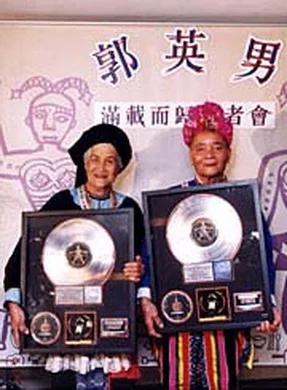
The Duanas, holding their platinum records for the album in which Return to Innocence appears
Later down the line, the Duanas were linked up with a competent, ethically-acceptable producer who helped them make an album of their own, "The Circle of Life". And this album, oh boy, this album is great.
It really is just, so good. It has some amazing fully-new compositions and beautiful takes on traditional songs and, of course, it has "Elders Drinking Song", the song that started this whole ordeal, but now, sang with the comfort of knowing that they own this arrangment, and they can make money from the work that they've put into it. It is, in my opinion, the ethical way of consuming this melody.
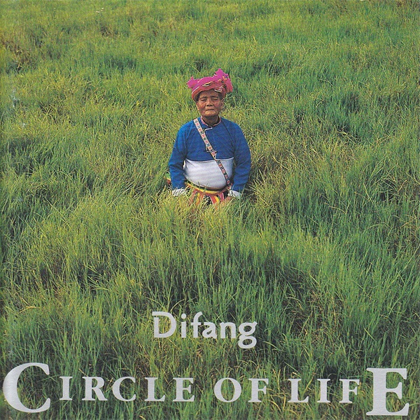
Cover for Difang's "Circle of Life" album
Now, there's a lot to be said about copyright law and how it steps over folklore. Traditional music tends to be on the public domain, as the original composers/writers/performers can't be found, since these forms of music were passed down from mouth to mouth rather than from legally bound copyrighted composition to a hand that wants the legal paperwork. This is why Cretu thought it'd be okay to simply use the song, paying a fee to an institute that didn't quite own the music either. Yes, they did legally own the recordings, but the Duanas weren't informed that their live performances would be recorded, so, isn't that closer to stealing? But what he didn't know, and what a lot of people don't know, is that while you can't own traditional folkloric music, you can own the arrangment you make of it. And indeed, the Duana's arrangment of Elders Drinking Song was fully original and they owned all rights to it, as the creators. Not legally, but they did have a base to build a case from. Of course it was all settled out of court, but the material is still there.
If you know me, you know that personally i am not a big fan of copyright, so you might think it's weird of me to be so fixated on this case, but truth be told, when white people treat traditional music as "exotic" and "mysterious" and proceed to use it completely devoid of its original context, and they don't even pay any sort of royalty to the singers behind it, that's when i get a little mad and air on the side of defending copyright. I think that copyright is far from being on the side of artists, and it's more on the side of corporations who have the money to arrange these kinds of legal deals (after all, the Duanas never bothered with this kind of legal stuff until they felt that enough was enough), but in this case, i'm glad they had something to build a case from, and i'm glad justice was served, if in a small way.
The Duanas were never in it for the money. They'd allow people from all around the world to come to their house and record their songs, just to share the beauties of Amis polyphonic singing, just to have this music become a worldwide phenomenon. And indeed, Amis singing was heard all over the world, but not in the way they intended. The legal actions they took were, in my eyes, mostly to put honor in their name, and to bring Amis music to the world the way it was intended to be heard, and not as curated by a pretentious german new age producer with little regard to the original context behind the song he sampled.
Difang Duana died due to complications with Sepsis after being bit by a venomous centipede, and Igay died a month later, on May 2002.
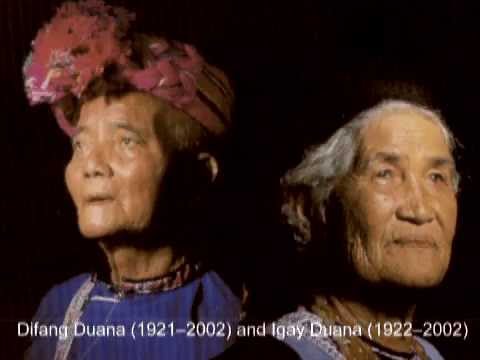
I want this article to be a sort of tribute to the Duana's legacy. To the music they produced and the Amis tradition. The Duanas wouldn't have wanted their music to die with them.
I can't seem to find any reliable or official ways to support their music, nor do i know where the money from their streams is going, but i think the safest route is to enjoy their music through spotify.
Difang once said "Everyone in the world knows my voice, but no one knows it's mine". Let's change that. Let's all listen to the Duana's legacy and let's celebrate their culture.
So, in true stan fashion i want to end this article by saying: Anyway, stream Circle Of Life on Spotify.
Listen to Difang's "The Circle of Life" here
(Note: The main source of information for this article was Nancy Guy's "Trafficking in Taiwan Aboriginal Voices", a paper published on "Handle With Care: Ownership and Control of Ethnographic Materials". If you want to check out more information about the Duana's case, give it a read. Thank you Nancy Guy!)
